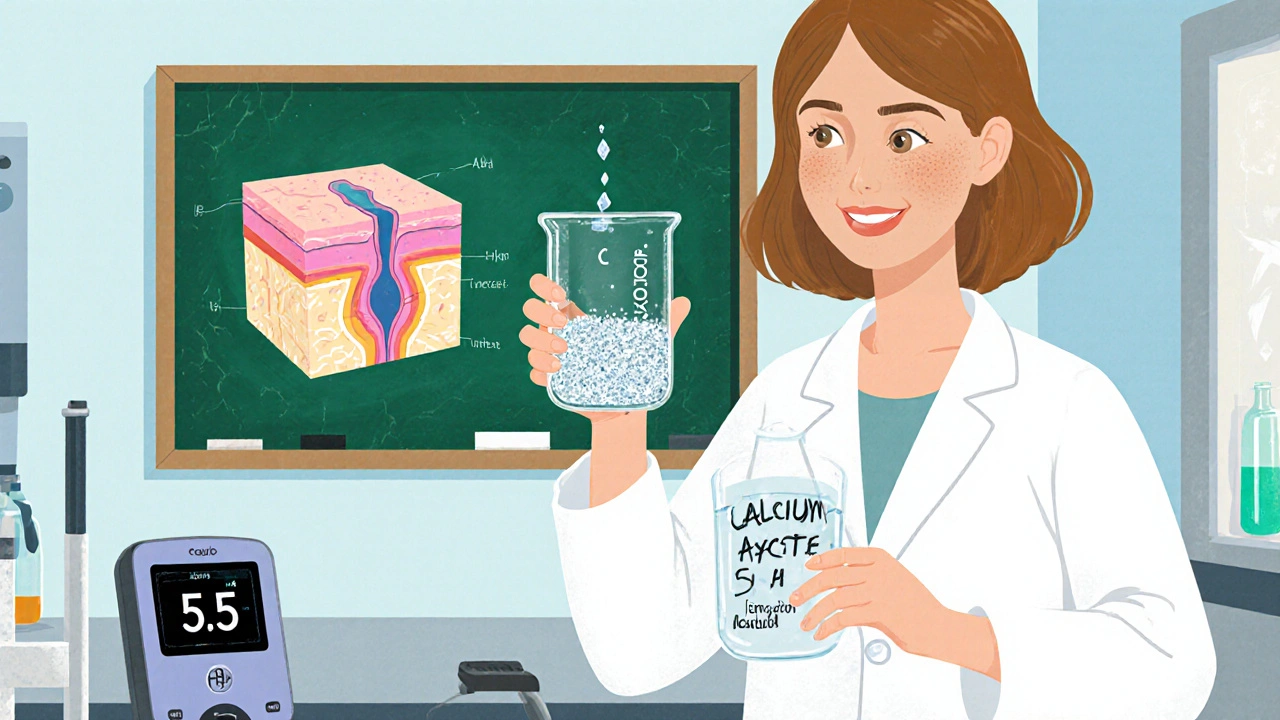Nutrient Deficiency Symptom Checker
Select the symptoms you're experiencing to identify potential nutrient deficiencies affecting your skin and hair. This tool is based on the article's information about nutrient absorption. For persistent symptoms, consult a healthcare professional.
Select Your Symptoms
When your body struggles with poor nutrient absorption is a condition where the gastrointestinal tract fails to extract enough vitamins, minerals, and macronutrients from the food you eat. poor nutrient absorption can feel invisible, but your skin and hair often scream the warning.
Understanding Poor Nutrient Absorption
At its core, malabsorption means the small intestine-especially the duodenum and jejunum-can’t efficiently transfer nutrients into the bloodstream. Common culprits include chronic inflammation (like in Crohn’s disease), low stomach acid, pancreatic enzyme deficiency, and imbalances in the gut microbiome. Even seemingly harmless factors such as excessive coffee, high‑fiber diets without adequate fluids, or prolonged use of certain medications can blunt the gut’s ability to absorb what you eat.
Key players in the absorption process are:
- Digestive enzymes that break down proteins, fats, and carbs.
- Transport proteins that ferry vitamins and minerals across intestinal cells.
- The gut lining itself, which must stay healthy and intact.
When any of these pieces falter, the body goes into a deficit mode, pulling reserves from skin, hair, and nails first-because those tissues are not essential for immediate survival.
How It Shows Up on Your Skin
Skin is a mirror for internal health. Here are the most common skin clues linked to nutrient shortfalls:
- Vitamin A deficiency often leads to dry, flaky patches and a dull complexion. This vitamin is crucial for the production of sebum, the oily barrier that keeps skin supple.
- Low Vitamin D can trigger eczema‑like rashes and slow wound healing.
- Insufficient Zinc shows up as acne‑like lesions, especially around the mouth and chin.
- Iron shortage often manifests as a pale, almost waxy skin tone and may make existing redness appear more pronounced.
- Omega‑3 fatty acid deficits can cause a loss of skin elasticity, making fine lines more noticeable.
These signs don’t appear overnight. If you notice persistent dryness, unexplained rashes, or a loss of that healthy glow, it’s worth checking if your gut is delivering the nutrients your skin craves.
Hair Warning Signs
Hair is another early casualty of poor absorption. The follicles rely on a steady stream of proteins, iron, and specific micronutrients. Common red flags include:
- Excessive shedding during washing or brushing-often linked to iron or biotin (a B‑vitamin) deficiency.
- Slow growth rate, which can point to a lack of omega‑3s and vitamin D.
- Dry, brittle strands that break easily-often a sign of insufficient zinc or essential fatty acids.
- Scalp inflammation or dandruff, sometimes tied to vitamin A or probiotic imbalances.
Because hair growth cycles span weeks to months, you might not notice the problem until the follicle has already been starved for a while.

Key Nutrients Your Body Needs
Below is a quick reference of the nutrients most tied to skin smoothness and hair strength, along with typical food sources and what happens when absorption falters.
| Nutrient | Main Skin Role | Main Hair Role | Food Sources |
|---|---|---|---|
| Vitamin A | Maintains oil production, supports cell turnover | Keeps scalp moisturized | Sweet potatoes, carrots, liver |
| Vitamin D | Reduces inflammation, aids barrier repair | Stimulates hair follicle cycling | Fatty fish, fortified dairy, sunlight |
| Zinc | Regulates oil glands, fights acne | Strengthens keratin structure | Pumpkin seeds, oysters, beans |
| Iron | Supplies oxygen for skin cell metabolism | Fuels growth phase of hair follicles | Red meat, lentils, spinach |
| Omega‑3 (EPA/DHA) | Improves elasticity, reduces redness | Enhances shine, reduces breakage | Salmon, chia seeds, walnuts |
| Biotin (B7) | Supports fatty acid synthesis for skin lipids | Promotes thick, resilient strands | Egg yolk, nuts, sweet potatoes |
Boosting Absorption Naturally
Fixing the gut is often more effective than simply loading up on supplements. Here are proven strategies you can start today:
- Chew Thoroughly - Digestion begins in the mouth. Proper chewing mixes food with saliva, kicking off enzyme activity.
- Include Digestive Enzymes - If you have pancreatic insufficiency or chronic bloating, a broad‑spectrum enzyme capsule (amylase, protease, lipase) taken with meals can improve breakdown of carbs, proteins, and fats.
- Balance Stomach Acid - Low acid (hypochlorhydria) hampers mineral absorption. A small dose of betaine HCl before meals can restore acidity, but only after consulting a clinician.
- Eat Fermented Foods - Sauerkraut, kefir, and kombucha introduce beneficial bacteria that synthesize certain B‑vitamins and improve mucosal health. Probiotics can also reduce inflammation that blocks nutrient transport.
- Pair Fats with Fat‑Soluble Vitamins - Vitamins A, D, E, and K need a lipid carrier. Drizzle olive oil over a salad rich in carrots or add avocado to a spinach smoothie.
- Mind Your Drink - Excessive coffee or tea can increase stomach acidity, while high‑alcohol intake damages the villi. Limit these beverages, especially around meals.
- Stay Hydrated - Adequate water keeps the intestinal lining flexible, allowing nutrients to pass through more easily.
When dietary tweaks aren’t enough, targeted supplements can fill gaps. Choose a high‑quality multivitamin that lists “chelated” minerals (for better uptake) and consider adding single‑nutrient pills of zinc, iron, or omega‑3s based on blood test results.

When to Seek Professional Help
If you notice any of the following, it’s time to get a deeper evaluation:
- Sudden, severe hair loss or a patch of baldness.
- Persistent, unexplained rashes that don’t respond to topical care.
- Digestive symptoms such as chronic diarrhea, bloating, or foul‑smelling stools.
- Unexplained fatigue, shortness of breath, or rapid heart rate (possible iron deficiency).
Healthcare providers may order a comprehensive panel that includes CBC, ferritin, serum vitamin D, and a stool test for pancreatic elastase. If celiac disease or Crohn’s is suspected, specific antibody tests and imaging may follow.
Quick Checklist to Protect Your Skin and Hair
- Track at least three meals a week for chewing time - aim for 20-30 chews per bite.
- Add a source of healthy fat to every vitamin‑A or vitamin‑D rich dish.
- Include a fermented food or probiotic supplement daily.
- Limit coffee/tea to one cup before meals.
- Schedule a blood test if you notice persistent dryness, hair thinning, or chronic digestive upset.
Frequently Asked Questions
Can I fix skin problems just by taking vitamins?
Vitamins help, but if your gut can’t absorb them, the benefits stay in the stomach. Combining supplements with strategies that improve digestion gives the best results.
What are the top three nutrients I should check for hair loss?
Iron, zinc, and omega‑3 fatty acids are the most frequently linked to thinning hair. A simple blood test can reveal deficits, and dietary tweaks or targeted supplements can restore balance.
Is it safe to take betaine HCl without a doctor’s approval?
Only if you’ve already ruled out ulcers or GERD. Over‑acidifying the stomach can cause irritation, so a short trial under professional guidance is safest.
How long does it take to see skin improvements after fixing my gut?
Most people notice smoother texture and less redness within four to six weeks, but deeper issues like chronic eczema may need three months of consistent support.
Can probiotics alone cure malabsorption?
Probiotics improve the microbial balance and can boost certain vitamin productions, but they don’t replace the need for enzyme support or medical treatment when structural gut damage is present.








Xavier Hernandez
October 15, 2025 AT 15:37Listen up, folks – if your gut is slacking on the nutrient pickup, your skin and hair will call you out fast. It’s not some mystical curse; it’s a plain‑old failure of the tiny absorptive army in your intestines. When that army deserts the battlefield, your body robs the “nice‑to‑have” layers first, leaving you with flaky skin and brittle strands. So, before you blame the weather, check the gut.
Angel Gallegos
October 15, 2025 AT 17:43Honestly, this post reads like a watered‑down lecture that could have been a single bullet list.
Rica J
October 15, 2025 AT 19:56Alright, let’s break it down a bit. First off, chewing your food like a horse isn’t necessary, but a decent chew (think 20‑30 per bite) really fires up saliva enzymes. Also, don’t forget to pair fat‑soluble vitamins with a splash of healthy oil – that’s how you get A, D, E and K into your bloodstream. If you’re skipping ferments, you’re missing out on B‑vitamins that gut bacteria crank out on the daily. And hey, stay hydrated – water keeps your villi flexy enough to pass nutrients through. Lastly, if you’re popping coffee like it’s water, cut back before meals or you’ll keep scaring your stomach acid away.
Linda Stephenson
October 15, 2025 AT 20:13Great points! Adding a simple probiotic shake in the morning can give that extra B‑vitamin boost without any extra effort, and it’s especially kind to the gut lining.
Sunthar Sinnathamby
October 15, 2025 AT 22:26Enough whining about dull skin – you’ve got the power to flip the switch right now. Load up on omega‑3s, slam a quality multi‑enzyme capsule, and make sure every vitamin‑A rich dish gets a drizzle of olive oil. If you skip the chew, you’re basically feeding your gut junk. No excuses, get the gut working and watch your hair turn from straw to steel.
Catherine Mihaljevic
October 15, 2025 AT 23:00What they don’t tell you is that big pharma wants you to stay dependent on pills they push, because they profit from your gut not fixing itself.
Michael AM
October 16, 2025 AT 01:13Hey, I’ve seen a lot of people bounce back just by focusing on digestion first – a good enzyme blend and a bit of fermented food can make a huge difference for skin and hair.
Rakesh Manchanda
October 16, 2025 AT 02:36While the layperson may settle for generic supplements, a discerning individual recognizes that chelated minerals and targeted omega‑3 ethyl esters are the true hallmarks of efficacious formulation.
Erwin-Johannes Huber
October 16, 2025 AT 04:33Don’t get discouraged; consistency is key and even small changes add up over weeks, leading to noticeable improvements in both complexion and hair strength.
Tim Moore
October 16, 2025 AT 05:06It is incumbent upon the practitioner to assess the patient’s absorptive capacity through comprehensive laboratory testing, including serum ferritin, vitamin D levels, and fecal elastase, prior to instituting any supplementation protocol.
Erica Ardali
October 16, 2025 AT 06:46In the grand theater of the human body, the gut is the stage upon which every visage and strand of hair performs its fleeting act.
When the curtain of absorption falters, the audience – our skin and hair – not only notices, but reels in protest.
We are haunted by the paradox of consuming abundance yet presenting pallor and brittleness as if starved.
Such a dissonance is not a mere inconvenience; it is a moral indictment of neglect, a silent accusation whispered by each flake and every shed hair.
To ignore these signals is to turn a deaf ear to the body's aristocratic plea for balance.
Thus, we must cultivate reverence for the microscopic architects that ferry nutrients across the intestinal wall.
Enzymes, transport proteins, and the mucosal barrier are the unsung nobles of our physiology, deserving of our diligent support.
A diet bereft of mindful chewing, devoid of fermented allies, and barren of essential fats is tantamount to betraying those nobles.
One must therefore embrace the humble act of masticating each bite with deliberate patience, lest the enzymes be denied their stage.
Couple each Vitamin‑rich morsel with a kiss of olive oil, for the fat‑soluble virtues demand a lipid carriage to ascend.
Invite probiotic champions to your table; they will synthesize vitamins in situ, stitching the torn tapestry of absorption.
Should deficiency persist, seek the counsel of a learned clinician, for laboratory alchemy can illuminate the hidden deficits.
Only through this concerted, almost ritualistic approach will the skin regain its luminous glow and the hair its regal sheen.
Remember, beauty is not a fleeting cosmetic veneer but a reflection of internal harmony.
When the gut's chorus sings in unison, the external world bears witness to the silent symphony within.
Let this be the credo by which we honor our bodies: nourish the absorptive realm, and the outer canvas shall flourish beyond expectations.